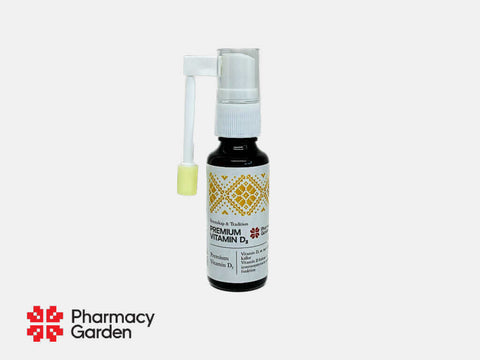What is Vitamin D3 and why do we need it?

Vitamin D3, also known as cholecalciferol, is an important nutritional compound that is not only essential for the health of our bones, but also plays a central role in many other bodily functions. It is often known as the "sunshine vitamin" because it can be formed in the skin when we are exposed to the sun's UVB rays. But what exactly makes D3 so important and how can it affect your health? Let's take a closer look at Vitamin D3 and answer some frequently asked questions.
What is Vitamin D3?
Vitamin D3 is one of several forms of vitamin D, which is a fat-soluble vitamin. D3 is the most biologically active form and can be obtained in two main ways: through the skin's synthesis when exposed to sunlight and through dietary supplements or food sources containing D3.
What is the function of Vitamin D3?
- Skeletal health: One of the best-known roles of Vitamin D3 is to promote a strong and healthy bone structure. It helps the body absorb calcium from the diet, which is necessary for bone mineralization and the prevention of bone diseases such as rickets in children and osteoporosis in adults.
- Immune System Function: Vitamin D3 is known for its ability to support the immune system. It can help prevent infections and reduce the risk of autoimmune diseases by regulating the immune response.
- Muscle function: D3 also plays an important role in muscle function, and its deficiency can cause muscle weakness and pain.
- Mental well-being: There are also indications that D3 may affect mental health and help reduce the risk of depression and other mental disorders.

Frequently Asked Questions about Vitamin D3
How do I get enough Vitamin D3?
- Sunlight: The easiest way to get D3 is through exposure to the sun. Daily exposure of skin to the sun for about 10-30 minutes depending on your skin type and location may be sufficient.
- Dietary supplements: If you have difficulty getting enough sunlight or have a deficiency, consider taking D3 supplements.
- Food sources: Some foods naturally contain D3, including fatty fish such as salmon and mackerel, egg yolks and dairy products.
How do I know if I have a deficiency of Vitamin D3?
- A blood test can measure your D3 levels. Common symptoms of deficiency include fatigue, muscle weakness, back and leg pain, depression and impaired immune function.
What are the risks of too much Vitamin D3?
- Overdosing on D3 can lead to excessive levels of calcium in the blood, which can cause kidney damage and other problems. It is important to follow dosage recommendations.
Who is most at risk for D3 deficiency?
- People who have limited exposure to sunlight, older adults, people with dark skin, and people with certain medical conditions are at greater risk of developing a deficiency.
Which form of Vitamin D3 is best?
Vitamin D3 extracted from wool, or more specifically from sheep's lanolin (wool fat), has some advantages over other sources of D3. Here are some of the benefits associated with D3 from lanolin:
- Natural Source: Wool fat (lanolin) is a natural source of D3 and is therefore a more natural form of the vitamin compared to synthetically produced D3. It is also closer to the form of D3 that forms in our own skin when we are exposed to the sun.
- High Bioavailability: D3 from lanolin has high bioavailability, meaning it can be easily absorbed and used by the body. This makes it effective in maintaining optimal D3 levels in the blood.
- sustainability: D3 from lanolin has a relatively long shelf life and can be stored for longer periods without losing its activity. This makes it easy to use as a dietary supplement.
- Easily accessible: D3 from lanolin is commonly found as a dietary supplement and is relatively readily available in health food stores and online.
- Possible Source for Vegans: Although D3 from lanolin is of animal origin, it is not directly from the animal kingdom and can sometimes be a choice for vegans and vegetarians who want to avoid other sources of D3 from animal products.
- Low Risk of Pollution: D3 from lanolin is less likely to contain impurities compared to some cod liver oils, which may have higher levels of heavy metals or other impurities.
Vitamin D3 an important nutrient compound that is essential for many aspects of health, including bone health, immune function and muscle function. To maintain optimal health, it is important to consider your exposure to sunlight, diet and any deficiencies with your doctor. So, remember to take care of your health by making sure you get enough of the "sunshine vitamin" in your life.


Leave a comment